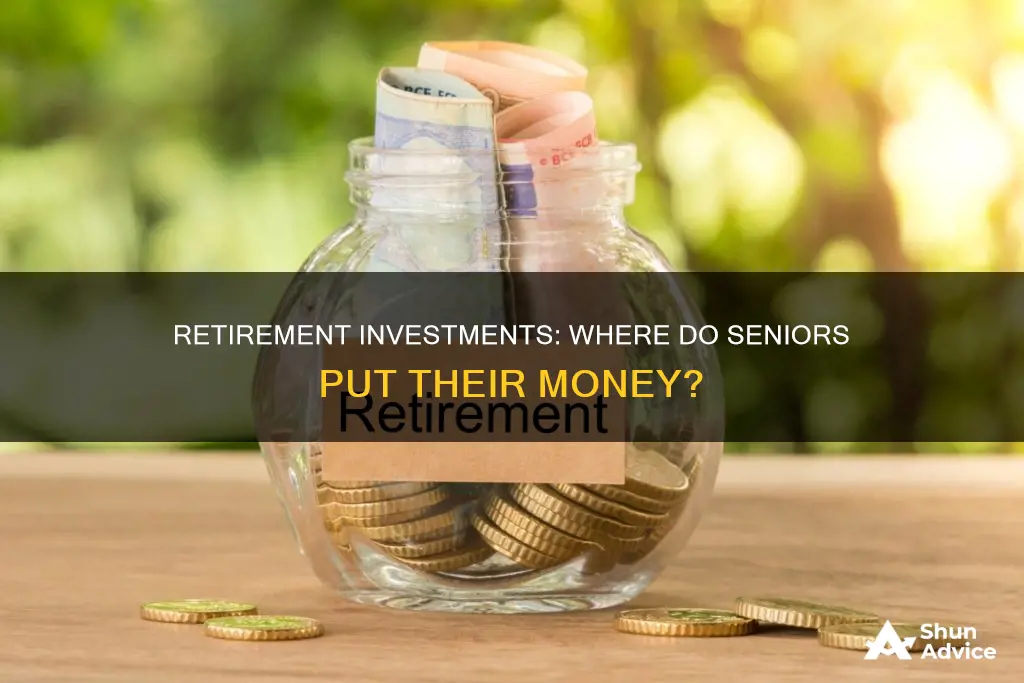
There are a variety of investment options for older people, each with different levels of risk and reward. Generally, older people are advised to shift their investments from stocks to safer options like bonds, high-yield savings accounts, and certificates of deposit (CDs). This is because older people typically have a lower risk tolerance since they no longer have a full-time job or labour income to recover from potential losses.
Some specific investment options for older people include dividend-paying stocks, treasury securities, money market accounts, and annuities. Additionally, investing in real estate, healthcare, and technology industries that cater to the elderly can be profitable due to the growing demand for senior housing and healthcare services.
It is important to consult a financial advisor to determine the most suitable investment strategies based on individual circumstances and risk tolerance.
| Characteristics | Values |
|---|---|
| Investment type | High-yield savings accounts, money market accounts, certificates of deposit, dividend-paying stocks, bonds, annuities, REITs, Treasury securities |
| Risk level | Low-risk, low-return |
| Investment strategy | Diversification, FDIC-insured accounts, low-risk/low-return investing |
| Age group | 65+, 70+ |
What You'll Learn

High-yield savings accounts
Safety and Insurance
Interest Rates and Returns
For example, with an APY of 5%, a savings balance of $10,000 would earn you around $500 in interest over a year. This is a much higher return compared to an account with a lower APY, where you might only earn around $40 in interest.
Fees and Requirements
When choosing a high-yield savings account, it's important to consider any associated fees and requirements. Look for accounts that don't charge monthly service fees, as these can eat into your interest earnings. Some accounts may also have minimum opening deposit or balance requirements, so be sure to review the terms carefully.
Additionally, some high-yield savings accounts may have restrictions on the number of withdrawals or transfers you can make each month, so it's important to understand the account's terms and conditions before signing up.
Online vs. Traditional Banks
However, one potential drawback of online banks is the lack of in-person branches and limited options for cash withdrawals and deposits. If these features are important to you, you may want to consider a high-yield savings account offered by a traditional bank or credit union.
Pros and Cons
Pros:
- Higher interest rates compared to traditional savings accounts
- User-friendly mobile platforms and digital tools
- Your money is generally safe and insured up to certain limits
Cons:
- In-person banking and branch access may not be available with online banks
- Cash withdrawals and deposits may be limited or unavailable
- Interest rates are variable and can change at any time
Makeup Investment: Who's Spending?
You may want to see also

Money market accounts
- Higher interest rates compared to regular savings accounts
- Federally insured up to $250,000 per depositor per bank by the FDIC or NCUA
- Well-suited for short-term financial goals
- Not intended for long-term financial planning
- May have minimum balance requirements, monthly fees, and restrictions on withdrawals
Small Investments, Big Returns
You may want to see also

Dividend-paying stocks
However, there is no guarantee of a risk-free return on dividend-paying stocks, as the company could decide to make changes and stop paying dividends. Additionally, while dividend-paying stocks can provide a more consistent income, they may not offer the same high returns as other investments.
When considering investing in dividend-paying stocks, it is important to assess the company's track record of dividend payments and the stability of the business. It is also worth noting that dividend-paying stocks tend to exhibit different pricing characteristics than growth stocks due to the regular income they provide, similar to a bond.
Forging Checks: A Risky Investment Gamble
You may want to see also

Real estate investment trusts (REITs)
REITs have to meet specific requirements to qualify as such. They must invest at least 75% of their total assets in real estate, derive at least 75% of their gross income from rents or real estate sales, and pay out at least 90% of their taxable income to shareholders as dividends each year. Most REITs focus on a particular property type, such as offices, apartment buildings, retail centers, or hotels, but some hold multiple types of properties.
There are three main types of REITs: equity REITs, which are the most common and own or manage income-producing real estate; mortgage REITs, which lend money to real estate owners and operators and generate income from the interest; and hybrid REITs, which use a combination of equity and mortgage REIT strategies.
REITs are a good option for older investors because they offer stable cash flow through dividends, attractive risk-adjusted returns, and diversification. They are easy to buy and sell, as most trade on public exchanges. Additionally, they are professionally managed and have a good track record of reliable and growing dividends.
However, there are a few potential drawbacks to consider. REIT dividends are taxed as regular income, and some REITs have high management and transaction fees. They also don't offer much capital appreciation since they have to pay out most of their income to investors.
Overall, REITs are a solid investment option for older adults looking for stable income, diversification, and relatively low risk.
Shiba Inu: Who's Invested?
You may want to see also

Treasury securities
Older investors seeking a stable and secure investment option can consider Treasury securities. These securities can be purchased directly from the US government on TreasuryDirect.gov or through banks or brokers. They are a good choice for those seeking a consistent income with guaranteed interest income. While the yields are fairly low, they offer a safe investment option for those in their retirement years.
It is important to note that Treasury securities are not without risks. They are vulnerable to inflation and changes in interest rates, which can impact their value. Additionally, the interest paid on these securities is taxable at the federal level. However, it is tax-free for states and localities.
Older investors, especially those in their 70s, can benefit from including Treasury securities in their investment portfolios. They offer a relatively low-risk option and are a good choice for those seeking a stable and consistent income during retirement.
Madoff's Web of Deceit
You may want to see also
Frequently asked questions
Safe investment options for seniors include high-yield savings accounts, certificates of deposit (CDs), dividend-paying stocks, annuities, and Treasury securities. These options typically offer low risk and stable returns, making them suitable for older individuals who want to protect their capital and generate passive income during retirement.
Recommended investments for a 70-year-old include Treasury securities, dividend-paying stocks, and annuities. These options offer relatively low risk and stable income potential, which aligns with the financial goals of most individuals in this age group.
High-return, low-risk investments suitable for retirees include bank certificates of deposit, high-yield savings accounts, a 60/40 mix of stocks and bonds, and money market funds. These options provide a balance between capital preservation and income generation, addressing the need for stable returns and liquidity during retirement.







